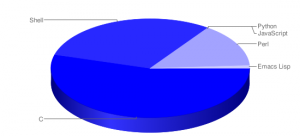jugando a praxis
I third Lindsay’s and Bethany’s motion to declare coding a pleasurable activity. I have been tingling with guilty pleasure for the past couple of weeks doing the exercises that the Slab developers have prepared for us. The guilt comes from the distance between these puzzles and the dissertation chapters I have spent the better part of this year writing. I know I will not feel guilty for long. Very soon I will begin coding for my digital edition of Aimé Césaire’s Et les chiens se taisaient and coding will just be what I do in lieu of writing for a while.
My pseudo-catholic reaction to code was very revealing to me. After all, why should anyone feel guilty to learn a new language? Why does it feel like a forbidden art? These questions got me thinking about the alleged differences between natural languages and computer languages. In the English Department, nobody would bat an eyelid if you said you were learning Farsi. Somehow Farsi could be integrated to your work as a scholar. Coding on the other hand still feels alien. It shouldn’t. The fact that it does speaks to that imaginary border between scholarship and service. As English graduate students, well-steeped in the scholarship of Benedict Anderson or Walter Mignolo, we should recognize by now that borders are reified in the performance of a nationalism. I belong to the literary scholar nation, you belong to the librarian nation, etc. I am a migrant in the fullest sense of the word. To me these borders seem silly… and dangerous.
The languages of Git
Another (false) difference between natural languages and code got me thinking further about what we’re doing here. If a speaker of two languages sees a paragraph where those two languages intermingle, they recognize the meaning immediately. At first sight, computer languages don’t seem to behave that way. After all, you can’t really insert a PERL line at random in a Ruby script and expect the interpreter to recognize it. This difference is also artificial. There is a right way and a wrong way to mix Spanish with English, just as there is a right way to mix Java with PHP. In order to produce meaning you just have to do it the right way. Git, for example, is written mostly in C, but with substantial contributions by other languages. Junot Diaz’s The Brief and Wondrous Life of Oscar Wao is written mostly in English, with some Spanish thrown in the mix. Even for Spanglish speakers the text follows certain rules to make itself clear. All that to say, that for those of us who are becoming bilingual (again), it is not caos total, but just a new set of procedures.

